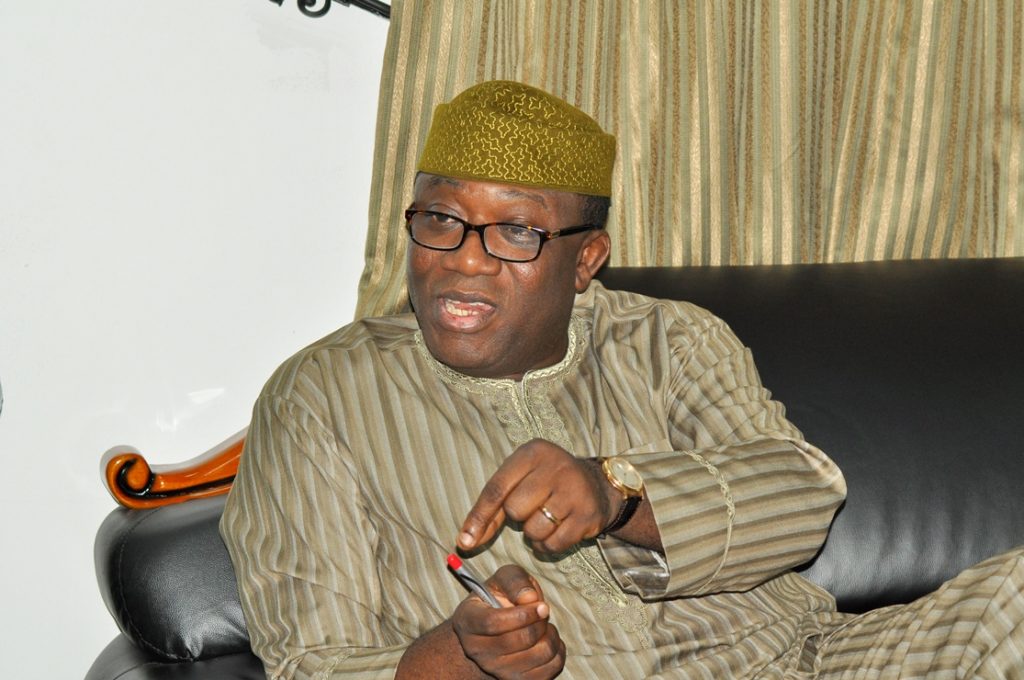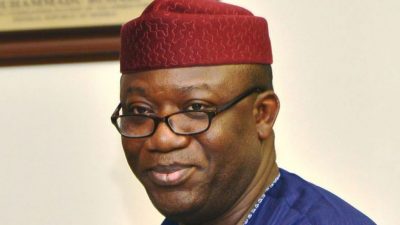On Sunday, Kayode Fayemi was declared winner of the Ekiti state governorship election, defeating Kolapo Olusola, the incumbent deputy governor of the state, who ran under the Peoples Democratic Party (PDP). Call it the second coming of the former governor of the state and you are not far from the truth.
His victory came as a surprise to some, considering he was running against the anointed candidate of the incumbent governor and – you wouldn’t believe – that the state had previously barred him from holding public office.
What other things do you know about the incoming governor of Ekiti, aside that he worked as minister of mines and steel development?
EARLY LIFE
Born on February 9, 1965, Fayemi is a native of Isan-Ekiti in Oye local government area of the state. He attended Christ’s School, Ado Ekiti and received degrees in History, Politics and International Relations from the Universities of Lagos and Ife in Nigeria. He also has a doctorate degree in war studies from the University of London, England, specializing in civil-military relations.

POLITICAL CAREER
Fayemi assumed office as the governor of Ekiti in October, 2010, but not without legal battles, with Segun Oni’s victory had being nullified by an appeal court sitting in Kwara state. In 2014, he sought o seek a second term in office but was defeated at the polls by Ayodele Fayose, the incumbent, who was at the time returning for a second tenure.
In November 2015, President Muhammadu Buhari named him as his minister of mines and steel development where he stayed up till May 30, 2018, before resigning to contest the Ekiti governorship election.
ACADEMIC, TECHNOCRAT
His research and policy interests include: Democratisation, Constitutionalism, Security Sector Governance, and Regionalism in the Global Context
Just like Olusola, his major opponent, Fayemi had spent many years in the academic front before eventually venturing into full time politics. The governor-elect is a fellow of the Centre for Peace and Conflict Studies; University of Ibadan; adjunct professor of security studies at the African Centre for Strategic Studies; National Defense University, Fort McNair, USA. He was also a Visiting Professor in the African Studies Programme at Northwestern University, Evanston, USA in 2004.
He was a director of the Centre for Democracy & Development (CDC), and had worked as a lecturer, researcher and strategy development adviser in Nigeria and the United Kingdom.
He was strategy development adviser at London’s City Challenge; research fellow at the African Research & Information Bureau in London, UK, technical expert to ECOWAS on small arms and light weapons and United Nations Economic Commission of Africa on governance issues. He was also a member of Africa Policy Advisory Panel of the British Government, and once chaired the Commonwealth human rights initiative’s committee of experts on developing guiding principles and mechanisms of constitution making in Commonwealth Africa.
HAD AN ENCOUNTER WITH GOWON AT THE AGE OF FIVE
Fayemi’s father was as an information officer in government and that, to a large extent, exposed him to life generally and earned him some level of fame at a tender age.
He reportedly had his first ‘political outing’ at the age of five when he joined in welcoming Yakubu Gowon to Ibadan during the military regime.
According to Femi Orebe, a political analyst, Fayemi’s father had, through his office, also “exposed him at a very early stage in life to newspapers, many of which he read daily, thus imperceptibly learning and internalising lessons in current and public affairs, especially politics that today stand him in good stead as they all combined to shape his career choices.”
HIS ROLE IN ENTHRONING DEMOCRACY IN NIGERIA
Said to be one of the leaders of the Nigerian opposition to military rule, Fayemi was involved in the founding and management of opposition radios such as ‘Radio Kudirat’. His book, Out Of The Shadows: Exile and the Struggle for Freedom & Democracy In Nigeria, contains an account of the process and roles he played in the setting up of Radio Kudirat.
He also talked about his struggle for Nigeria’s democracy book in a 2005 interview: “Out of the Shadows is a political memoir; it is the story of my own personal development, particularly, it is a story about the exile movement and the struggle for freedom and democracy in Nigeria in the last one decade. It tells the story of my role in the opposition movement to military rule, it tells the story of my activities as a shuttle diplomat for the opposition movement.”
DROVE TAXI, WORKED AS GUARD
While delivering the 2016 convocation lecture of the University of Lagos, Fayemi had talked about his tortuous journey to becoming successful in life.
According to PUNCH, the governor said he did some menial jobs including driving taxis and working as a guard. He was quoted as saying: “Be prepared for surprises and disappointments, because life is bound to hand you a couple of them. The only guarantee you have in this life is what you do for yourselves with the grace God has bestowed on us all.
“What you need to know, however, is that as a UNILAG graduate and a postgraduate student in the United Kingdom, I have driven taxis and worked as a guard, amongst other several menial jobs to survive.’’
BARRED FROM PUBLIC OFFICE IN EKITI
In January, the Ekiti state government barred Fayemi from holding public office in the state for at least 10 years.
The government had based its action on the report of the judicial commission of inquiry, which allegedly indicted the former minister of mines and steel development over alleged mismanagement of the state’s finances between October 2010 and 2014.
Accusing his predecessor of mismanaging funds of the state, Fayose had set up a panel to probe his predecessor. Fayemi had shunned all the summons of the panel which he referred to as “kangaroo”.
HIS VOTE OF NO CONFIDENCE AND BATTLE WITH HOUSE OF REPS
The story of Fayemi’s journey as minister of mines and steel development would be incomplete without the mention of his battle with lawmakers in the house of representatives. The two parties had failed to reach a consensus regarding the Ajaokuta steel company.
While Fayemi stood for the concession of the company, the lawmakers wanted it completed by the federal government.
The last straw was on March 1 when Fayemi’s absence at a debate organised by the lower legislative chamber had angered them, prompting them to declare a vote of no-confidence on him and Abubakar Bwari, his minister of state counterpart.
‘HOW FEDERAL FORCES MANIPULATED EKITI 2014 GOV POLL’
Fayemi had lost his second term bid to Ayodele Fayose during the state governorship election in 2014.
In an interview with TheNation, he had talked about how “federal forces” allegedly rigged the election in favour of Fayose, then candidate of the PDP.
According to him, “the election was not about Ekiti, it was turned to federal forces against APC in the state. We saw the federal forces at play in the election and they were undisguised in their desperation. When security agents that are supposed to be neutral for example go round picking party leaders the night before an election and party anchors on the day of election in a coordinated and choreographed manner with no charge levelled against them, clearly you had a pre-determined end that you are seeking.” (The Nation)


